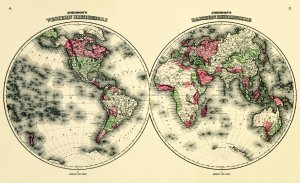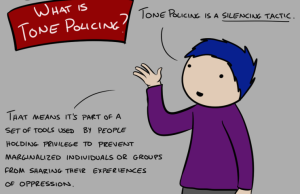Originally published on The Establishment and republished here with their permission.
In 2016, everything failed.
A massively garbage year on the trash heap of history. This was the year that we took all of our society’s weaknesses, mixed them all together, put them in the oven, and ended up with a Donald Trump presidency.
And at the center of it all, was our media. Our horrible, no-good, very bad media.
Now, before I start sounding like a Fox News commenter shouting “Lame-stream media!” (which, PS, is ableist), let me just say this:
- I know there are some really good sources of information and commentary out there (I happen to believe that this very publisher is one of them).
- I understand the weirdness of a member of media talking about how much media sucks.
There are a lot of news and information sources out there and, truly, all the information you need to make good decisions is already being written by somebody.
But in the grand scheme of things, know this: For every dogged reporter trying to get an important scoop, there are three writers trying to make facts as unrecognizable as possible.
For every editor obsessing about the accuracy of pieces, there are three trying to come up with the clickbait-iest titles they can. For every publisher trying to inform, there are three trying to “infotain.”
2016 was the year where we chose fake news over real and placation over edification.
While our media has played a very large part in this, we’d be neglecting our own responsibility if we said that this was all their fault.
These are tough times for news media.
Nobody watches TV anymore, less than nobody gets the paper delivered, and nobody has figured out how to make money off of the Internet. Our media sources are struggling to stay afloat and battling for what little money is out there.
No one is getting rich off of this game anymore. So many of our media companies are going where the money is, and the money isn’t in real news – it’s in confirmation: confirmation of your worst fears, of your bigotries, of your animosities, of your unequivocal rightness.
Yes, it feels good to read news stories that prove how wise you are, but that instant gratification keeps us from growing – at best – and makes us far less wise, at worst.
Bad media can make us ill-informed, cruel, divisive, apathetic, and complacent.
In order to save ourselves, we must first save our media. And we must do that by forcing it to become better.
Here are some ways you can start.
1. Verify All Sources
I don’t care if it’s the New York Times or The Wall Street Journal – nobody is to be trusted at face value.
Click on all links and make sure the different sources independently verify what the article says. Also, make sure that the article doesn’t just link to an identical version of the same story (a clear warning sign that the publisher is cutting corners by lifting language from the original source story).
No links in the piece? If it’s an opinion piece, fine – just remember that it’s nothing more than opinion.
If it’s a piece reporting news, a quick Google search should be able to verify if what you’re reading is true. But after that, give that publisher a lot of side-eye for not listing sources.
Can’t verify a piece? Do. Not. Share. It.
2. Call Out Misleading Headlines
One of the most damaging things to happen to modern media is the SEO headline.
The lengths to which some editors will go to get clicks is not only misleading, but often dangerous – because nobody reads articles anymore.
If you see a headline that in no way matches the article, or seems to drum up controversy that isn’t actually there, make your displeasure known with the editors (not the writers – they almost never get to choose the titles for their pieces), and let them know that if this continues, you will no longer be reading their articles.
Editors are doing this for the clicks, and threatening your future readership is the only thing that will get them to stop.
3. While We’re Talking About It – Read the Actual Article
I’ve often joked that I’m going to rename all my articles “Shit You Won’t Read Before Commenting.”
My point is: Read the article. The whole article. Not just the headline. Not just the comments by your friend who shared it. Not just the Twitter replies. Read the article.
Then, stop and think about it before you comment.
4. Diversify Your Media
Not just diversity in your writers, but diversity in editorial slant, subject matter, and country of origin.
Read things that make you uncomfortable. Read things that are boring. Read whatever you can that seems sincerely and ethically written.
Remember: You are reading to be better informed. That is not always fun, it’s not always interesting, it’s rarely what you expected – but it’s always worth it.
5. Demand That Your Media Stop Participating in the Normalization of Violence
Calling rape a “controversial sexual encounter?” Calling a hate crime a “racially charged incident?” Calling an outright lie a “mistake?” Calling White Supremacists the “Alt-Right?”
Call it out, each and every time.
Ask your friends and community to do the same, and keep your readership with publications who aren’t willing to coddle hatred in order to project a false sense of “objectivity.”
6. Pay for Your Media
Ugh, right? I understand, the Internet tells us that everything should be free, but really – how do you think writers get paid?
If you value quality writing and editing, that requires enough money for the writers and editors to take the time to do a good job.
Don’t run from paywalls of publications you admire. Don’t ignore that “donate” button – pay for your quality media before they’re forced to cut some really important corners.
When you put money into quality publications, not only does it allow those publications to continue to put out quality work, but it encourages slacking publications to start doing the same to get in on those integrity bucks.
7. Stop Sharing Harmful Publications
One of the ways in which some of the worst of our industry makes money is from the “quick click” – yes, this headline seems true so you just share it because you want to get that information to your friends right away.
But often, even if that piece of hot news is true, that click is used to finance the 30% of that publication’s articles that aren’t true or are highly misleading.
Once a publisher has shown itself to regularly publish false, or misleading, or hateful articles – ban them forever.
There is no way to share their work without contributing to the damage they do.
So there you have it, seven steps to help overthrow media in 2017. Revolution starts here.
Read more from The Establishment:
[do_widget id=’text-101′]
Ijeoma Oluo is a Seattle-based writer, speaker, and Internet yeller. She was named one of the most influential people in Seattle by Seattle Magazine. She’s the Editor-at-Large at The Establishment – a media platform run and funded by women.
Search our 3000+ articles!
Read our articles about:
Our online racial justice training
Used by hundreds of universities, non-profits, and businesses.
Click to learn more





















